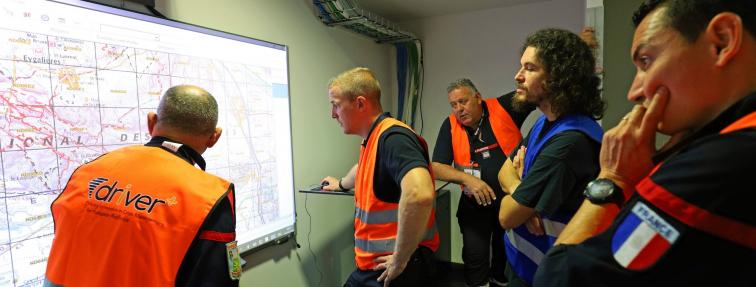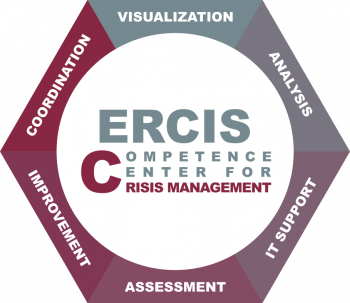
The C3M concentrates on six research topics within the field of crisis management and humanitarian logistics, starting at visualization of processes within humanitarian organizations up to coordination of humanitarian supply chains in disaster relief operations.
-
Visualization
The research field visualization elaborates on the modeling of humanitarian supply chains. The development and deployment of an IT-supported reference model for humanitarian supply chains provides a common terminology, predefined tasks and aligned processes. Moreover, the visualization has the potential to ensure reusability and adaptability while respecting the end-users requirements.
Primary Research Objectives:
- Development and deployment of a reference model for humanitarian supply chains
- Providing common terminology, predefined tasks, and aligned processes
- Ensuring reusability and adaptability
- Respecting the end-user requirements

-
Analysis
The C3M’s analysis research area concentrates on performance measurement and management. The development and deployment of a performance measurement system for humanitarian logistics establishes prerequisites for a process-driven, modular, adaptable and reusable framework. Progress within this research area also enables crisis management to benefit from an open objective- and process-related KPI set, management capabilities and an enhanced IT support.
Primary Research Objectives:
- Development and deployment of a performance measurement system for humanitarian logistics
- Process-driven, modular, adaptable and reusable framework
- Open objective- and process-related KPI set
- Management capabilities
- IT support

-
IT Support
Speaking of IT support, the C3M decided to devote an own research area to this enormously important topic. In this area basic research is conducted within the development and application of an IT requirements profile. The requirements profile is used to compare and evaluate existing supply chain management software for humanitarian logistics as well as for the design and deployment of missing IT tools. Next to this, other IS evaluation approaches, such as the DRIVER+ Trial Guidance Methodology, are developed and applied.
Primary Research Objectives:
- Contribution to the development of adequate information systems
- Development and application of a dedicated SCM-related IT requirements profile and other IS evaluation approaches
- Evaluation of existing SCM software and CM socio-technical systems
- Design of required and appropriate IT tools

-
Assessment
The assessment research area focuses the design and development of assessment tools for humanitarian logistics planning that play a particular role in crisis management. Providing a method to quickly filter and prioritize the assessment information that is relevant for the tasks at hand, represents an essential information advantage for those authorities, who finally need to decide how available resources can be best allocated.
Primary Research Objectives:
- Design and development of assessment tools for humanitarian logistics planning
- Providing a method to quickly filter and prioritize the assessment information that is relevant for the tasks at hand
- Supporting the collection, analysis and visualization of relevant information

-
Improvement
Referring to the best allocation of resources, the research area on improvement deals with the investigation and adjustment of appropriate operations research approaches for humanitarian logistics. Research within this topic concentrates on evaluation of existing quantitative methods for humanitarian logistics, design and development of relevant approaches ,especially in the areas of procurement and warehousing, as well as the application of simulation of humanitarian relief chains.
Primary Research Objectives:
- Improvement approaches
- Evaluation of existing quantitative methods and simulation approaches for humanitarian logistics and CM
- Design and development of relevant approaches
- Modeling of infectious diseases and simulation-based decision support for non-medical interventions

-
Coordination
Last but not least, the coordination research area is concerned with the governance of ad-hoc networks in crisis management. The development of mechanisms for information sharing and coordination for humanitarian supply chains evaluates for example the governance approaches for ad hoc coordination in the humanitarian context.
Primary Research Objectives:
- Development of mechanisms for information sharing and coordination for humanitarian supply chains
- Evaluation of governance approaches for ad hoc coordination in the humanitarian context
- Design of learning communities or living labs for evaluation of potential scenarios
- Development of an assessment framework for coordination in crisis management



